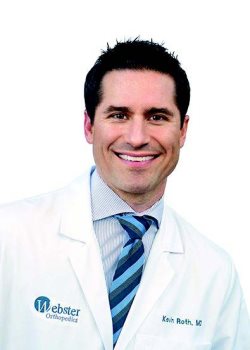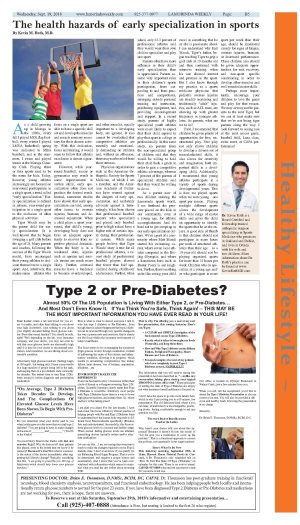| | Published September 19th, 2018
| The health hazards of early specialization in sports
| | | By Kevin M. Roth, M.D. |  | | |
As a child growing up in Moraga in the 1980s, every fall I played MOL flag football; every winter I played LMYA basketball; spring was dedicated to MBA baseball; and in the summers, I swam and played tennis at the Moraga Country Club. Playing three or four sports used to be the norm for kids. Today, however, young athletes increasingly are focused on year-round participation in a single sport, a trend called "early specialization." Early specialization is defined as intense, year-round participation in a single sport to the exclusion of other physical activities.
 Tiger Woods may be the poster child for early specialization (it is well-known that he began swinging a golf club before the age of 2). Many parents and coaches, following the success of the Tiger Woods model, have encouraged their young athletes to dedicate themselves to a single sport. And, intuitively, this makes sense - athletes who focus on a single sport are able to hone a specific skill set and develop the muscles and muscle memory necessary for their chosen activity. With this dedication, focus and training, it would seem to follow that athletic excellence is almost a guarantee.
Tiger Woods may be the poster child for early specialization (it is well-known that he began swinging a golf club before the age of 2). Many parents and coaches, following the success of the Tiger Woods model, have encouraged their young athletes to dedicate themselves to a single sport. And, intuitively, this makes sense - athletes who focus on a single sport are able to hone a specific skill set and develop the muscles and muscle memory necessary for their chosen activity. With this dedication, focus and training, it would seem to follow that athletic excellence is almost a guarantee.
 However, while year-round baseball, soccer or gymnastics may result in some improvements in certain skills, early specialization often does not produce the desired result. Instead, numerous studies have shown that early specialization can lead, among other issues, to overuse injuries, burnout, and decreased enjoyment. When a child plays a sport year-round, that child's young, developing body does not have an adequate opportunity to recover from repetitive physical demands. When the body is in a weakened state, injuries such as sprains and muscle strains are much more likely. Further, overused muscles have a tendency to become overdeveloped, and other muscles, equally important to a developing body, are ignored. It also cannot be overlooked that competitive athletics are mentally and emotionally demanding on children and, without an offseason, there may not be relief from those stresses.
However, while year-round baseball, soccer or gymnastics may result in some improvements in certain skills, early specialization often does not produce the desired result. Instead, numerous studies have shown that early specialization can lead, among other issues, to overuse injuries, burnout, and decreased enjoyment. When a child plays a sport year-round, that child's young, developing body does not have an adequate opportunity to recover from repetitive physical demands. When the body is in a weakened state, injuries such as sprains and muscle strains are much more likely. Further, overused muscles have a tendency to become overdeveloped, and other muscles, equally important to a developing body, are ignored. It also cannot be overlooked that competitive athletics are mentally and emotionally demanding on children and, without an offseason, there may not be relief from those stresses.
 Physician organizations such as the American Orthopedic Society for Sports Medicine, of which I am a member, and the American Academy of Pediatrics have warned against the dangers of early specialization and uniformly advocate against it. Interestingly, it has been shown that professional baseball players who specialized and played only baseball prior to high school have a higher rate of serious injury during their professional careers. While many people believe that Tiger Woods' story is true for all professional athletes, a recent study of professional baseball players showed that fewer than half specialized during childhood/adolescence. Further, when asked, only 22.3 percent of professional athletes said they would want their own child to specialize and play one sport.
Physician organizations such as the American Orthopedic Society for Sports Medicine, of which I am a member, and the American Academy of Pediatrics have warned against the dangers of early specialization and uniformly advocate against it. Interestingly, it has been shown that professional baseball players who specialized and played only baseball prior to high school have a higher rate of serious injury during their professional careers. While many people believe that Tiger Woods' story is true for all professional athletes, a recent study of professional baseball players showed that fewer than half specialized during childhood/adolescence. Further, when asked, only 22.3 percent of professional athletes said they would want their own child to specialize and play one sport.
 Parents often have more influence in their child's early specialization than is appreciated. Parents assume very important roles in their children's sports participation, from carpooling to and from practices and competitions, arranging outside personal training and instruction, purchasing equipment, and providing encouragement and support. In a recent study, parents of highly specialized youth athletes were more likely to expect that their child aspired to play that sport in college or professionally. In this same study, no parents from the non-specialized group of children said that they would be willing to hold their child back a grade in order to gain a competitive athletic advantage, whereas 7 percent of the parents of specialized children said that they would be willing to do so.
Parents often have more influence in their child's early specialization than is appreciated. Parents assume very important roles in their children's sports participation, from carpooling to and from practices and competitions, arranging outside personal training and instruction, purchasing equipment, and providing encouragement and support. In a recent study, parents of highly specialized youth athletes were more likely to expect that their child aspired to play that sport in college or professionally. In this same study, no parents from the non-specialized group of children said that they would be willing to hold their child back a grade in order to gain a competitive athletic advantage, whereas 7 percent of the parents of specialized children said that they would be willing to do so.
 As a parent now of two children entering the Lamorinda sports world, I see firsthand the pressure placed on the kids in our community, even at a young age, for athletic accomplishment. And it's hard not to get swept up in our early specialization culture. We're a part of a community where Matt Biondi started his swimming career, where seven local athletes competed in the Beijing Olympics, and where a hometown hero such as Buster Posey is our neighbor. Further, there's nothing quite like seeing your child excel in something that he or she is passionate about. I can understand why Earl Woods, Tiger's father, began teaching Tiger to grip a golf club at 10 months old and then continued with intensive training when his son showed interest and promise in the sport. But I also know through my practice as a sports medicine physician that pediatric overuse injuries are steadily increasing and traditionally "adult" injuries, such as ACL tears, are showing up with greater frequency in younger athletes. As parents, what are we to do?
As a parent now of two children entering the Lamorinda sports world, I see firsthand the pressure placed on the kids in our community, even at a young age, for athletic accomplishment. And it's hard not to get swept up in our early specialization culture. We're a part of a community where Matt Biondi started his swimming career, where seven local athletes competed in the Beijing Olympics, and where a hometown hero such as Buster Posey is our neighbor. Further, there's nothing quite like seeing your child excel in something that he or she is passionate about. I can understand why Earl Woods, Tiger's father, began teaching Tiger to grip a golf club at 10 months old and then continued with intensive training when his son showed interest and promise in the sport. But I also know through my practice as a sports medicine physician that pediatric overuse injuries are steadily increasing and traditionally "adult" injuries, such as ACL tears, are showing up with greater frequency in younger athletes. As parents, what are we to do?
 First, I recommend that children be given plenty of opportunities for free, unstructured play. Free play not only allows children to develop a diverse set of musculoskeletal skills, it also allows for creativity and imagination, both important skills in a developing child. Additionally, I recommend that young athletes participate in a variety of sports during developmental years. This is how we played sports when we were young - one sport per season. Playing multiple different sports allows the development of a wide range of motor skills and gives the child an opportunity to identify the sports that he or she enjoys. A good rule of thumb is that children should not participate in more hours per week of structured athletics than their age - so a 10-year-old should not be playing organized sports for more than 10 hours per week. Children who do specialize at a young age and/or who participate in more sport per week than their age, should be monitored closely for signs of fatigue, overuse injuries, burnout, or decreased performance. These children also should be given adequate opportunities for rest, recovery, and non-sport specific conditioning in order to develop other muscles and well-rounded motor skills.
First, I recommend that children be given plenty of opportunities for free, unstructured play. Free play not only allows children to develop a diverse set of musculoskeletal skills, it also allows for creativity and imagination, both important skills in a developing child. Additionally, I recommend that young athletes participate in a variety of sports during developmental years. This is how we played sports when we were young - one sport per season. Playing multiple different sports allows the development of a wide range of motor skills and gives the child an opportunity to identify the sports that he or she enjoys. A good rule of thumb is that children should not participate in more hours per week of structured athletics than their age - so a 10-year-old should not be playing organized sports for more than 10 hours per week. Children who do specialize at a young age and/or who participate in more sport per week than their age, should be monitored closely for signs of fatigue, overuse injuries, burnout, or decreased performance. These children also should be given adequate opportunities for rest, recovery, and non-sport specific conditioning in order to develop other muscles and well-rounded motor skills.
 Perhaps most importantly, encourage your children to love the game and play for that reason. We may or may not be parents to the next Tiger, but we can at least make sure that we're not being tiger parents along the way. I look forward to seeing you at the next soccer game, baseball field, Luna class, swim meet, or CAPA performance!
Perhaps most importantly, encourage your children to love the game and play for that reason. We may or may not be parents to the next Tiger, but we can at least make sure that we're not being tiger parents along the way. I look forward to seeing you at the next soccer game, baseball field, Luna class, swim meet, or CAPA performance!

|
 | | Dr. Kevin Roth is a Board Certified and fellowship trained orthopedic surgeon specializing in Sports Medicine who practices in Oakland and Dublin, and lives in Orinda with his wife and two children. More information about Dr. Roth's practice can be found at www.KevinRothMD.com. | | | | | | | | | | | |




